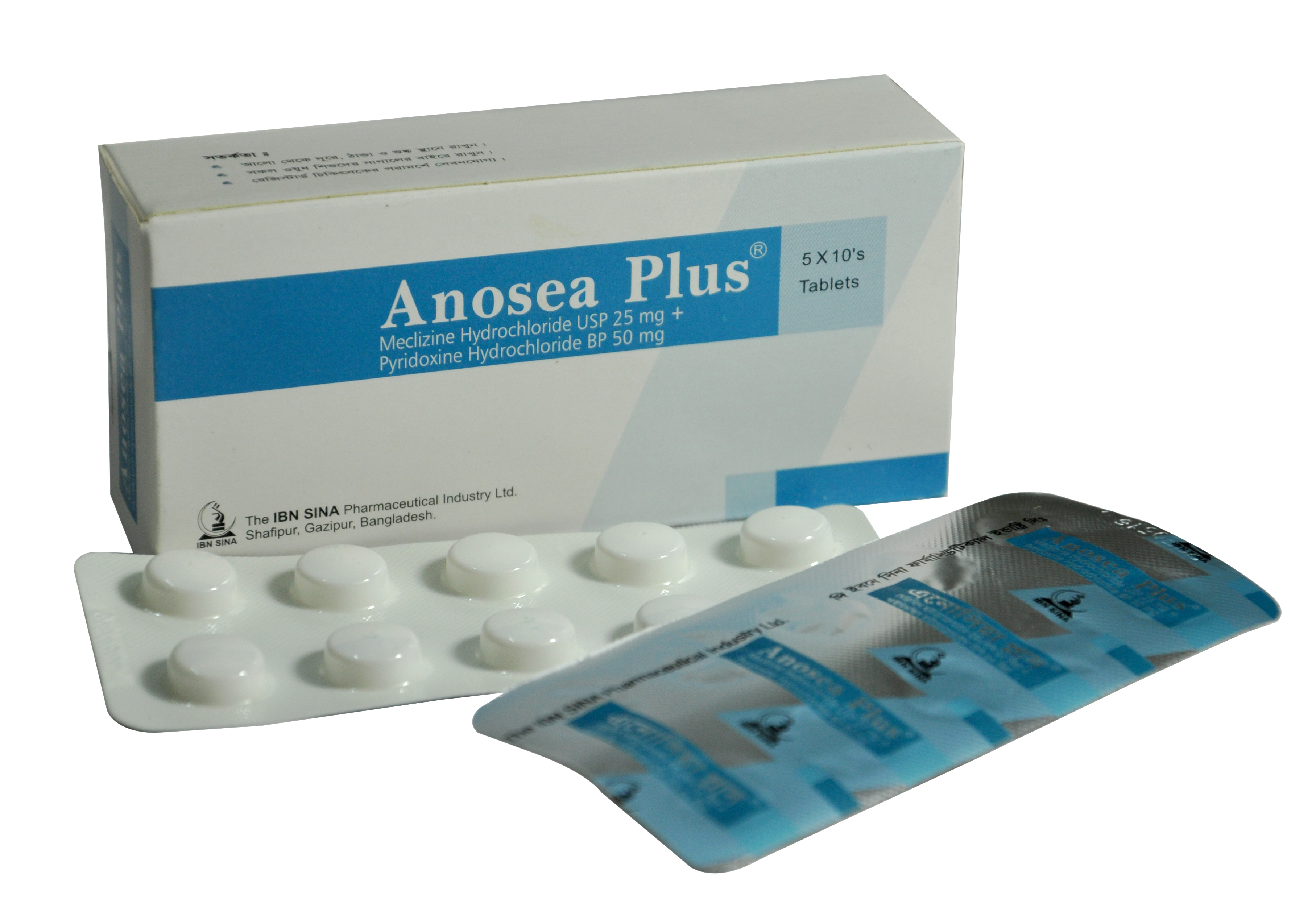
ANOSEA PLUS
MECLIZINE USP & PYRIDOXINE HYDROCHLORIDE BP
| NAME | STRENGTH | PACK SIZE | DOSAGE FORM |
|---|---|---|---|
| ANOSEA PLUS 25 MG & 50 MG | 25 MG & 50 MG | 50 S | TABLET |
Each film-coated tablet contains Meclizine HCl USP 25 mg and Pyridoxine HCl BP 50 mg.
Anosea Plus contains Meclizine Hydrochloride and Pyridoxine Hydrochloride. Meclizine has antiemetic, anticholinergic and antihistaminic properties. It reduces the sensitivity of the labyrinthine apparatus. The action may be mediated through nerve pathways to the vomiting center (VC) from the chemoreceptor trigger zone (CTZ), peripheral nerve pathways, the VC, or other CNS centers. Pyridoxine Hydrochloride (Vit-B6), either alone or in combination has been used to prevent nausea & vomiting due to its antiemetic properties.
For the prevention and treatment of nausea, vomiting, dizziness, motion sickness, morning sickness during pregnancy, drug induced nausea, vomiting induced by oral contraceptives or Estrogen preparations.
One tablet 1-2 times daily or as directed by physician.
Motion sickness: One or two tablets 1 hour prior to journey. The dose may be repeated every 24 hours during the journey. Vertigo: One tablet 2 times daily or as directed by the physician.
Labyrinthine and vestibular disturbances: The optimal dose of Meclizine Hydrochloride is usually 25 to 100 mg daily in divided doses, depending on the clinical response.
Radiation sickness: 50 mg (Meclizine Hydrochloride) administered 2 to 12 hours prior to radiation treatment. Pyridoxine Hydrochloride (Vit-B6) has been shown to be safe and effective in dosages of 50 to 200 mg per day.
Anosea Plus is contraindicated in individuals who have shown hypersensitivity to it.
Due to its potential anticholinergic action, patient with asthma, bronchitis, emphysema, enlarged prostate, glaucoma or urinary tract blockade should take Meclizine Hydrochloride (like other antiemetics) with caution.
Drowsiness, dry mouth, urinary retention, blurred vision have rarely been reported. Sensory neuropathy reported with high dosage of Pyridoxine Hydrochloride given for extended periods.
Pregnancy: Meclizine Hydrochloride is pregnancy category ''B'' drug. Large-scale human studies have not demonstrated adverse fetal effects. It has been suggested that, based on available data, Meclizine Hydrochloride presents the lowest risk of teratogenicity and is the drug of first choice in treating nausea and vomiting during pregnancy. On the other hand, Pyridoxine Hydrochloride is pregnancy category ''A'' drug. Pyridoxine Hydrochloride itself is considered as safe during pregnancy and has been used in pregnant women without any evidence of fetal harm. Lactation: Meclizine Hydrochloride may be distributed into breast milk. However problem in human have not been documented. On the other hand, Pyridoxine Hydrochloride has no adverse effects during lactation.
Clinical studies establishing safety and effectiveness in children have not been done, therefore, usage is not recommended in children under 12 years of age.
There may be increased CNS depression when Meclizine Hydrochloride and Pyridoxine Hydrochloride is administered concurrently with other CNS depressants, including benzodiazepines, barbiturates, tricyclic antidepressants, opiate agonists, skeletal muscle relaxants, antihistamine, alcohol, tranquilizers. Meclizine Hydrochloride can increased the absorption of digoxin by decreasing gastrointestinal motility. MAO inhibitors may prolong and intensify the anticholinergic effects of Meclizine Hydrochloride.
Symptoms: Extreme excitability, seizures, drowsiness and hallucinations. Treatment: Appropriate supportive and symptomatic treatment. Consider dialysis.
Store in a cool (below 30°C) and dry place. Keep away from light and out of reach of children.
Each box contains 5x10's tablets in blister pack.
